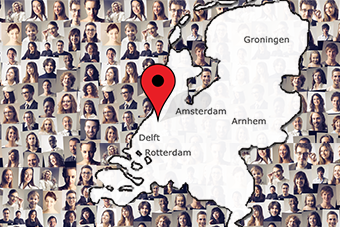
It’s estimated that The Netherlands will need over 600,000 international workers by 2050 to survive in a more globalized economy. As a result, large cities like Amsterdam, Rotterdam, Den Haag, Utrecht and Eindhoven will need to strengthen their links to creative-knowledge talent around the globe if they are to remain competitive, and must pay increasing attention to the conditions that attract and retain highly skilled international workers.
Highly skilled international workers serve many purposes in Holland’s economy, including filling short-term labor gaps as well as long-term skills shortages, thereby helping the gradual development of its skilled labor force.
Recently, the Accommodating Creative Knowledge (ACRE) project surveyed both native and international knowledge workers in 13 European city regions to determine what influences their location decisions. The project revealed two important conclusions:
1. The presence of family members or friends, following a partner, or having been born or having studied in a certain region (i.e. social capital) are the most important reasons for choosing a place to live in Europe.
2. Besides social capital, hard economic factors, like job opportunities, wages, and accessibility (e.g. facilitating work and residence permits), are the main drivers of relocation to Europe.
Therefore soft factors, such as cultural and entertainment facilities or outdoor activities and recreation, hardly played a primary role in driving migration decisions. Rather, both European natives and internationals tend to move because of the availability/accessibility of suitable jobs or because of personal ambitions and networks.
A recent 2013 study on the what causes the urban labor migration within Germany showed that all factors related to the labor market positively influence migration decisions. Cities with low unemployment, steady employment growth and high wages are the most attractive for international workers. However, the quality of life of a city was also found to influence where workers decided to live, especially nature amenities such as recreation areas, climatic conditions and accessibility.
A current study on internationals in the Eindhoven region revealed a similar pattern; indicating that over 60% of the international knowledge workers came to the Netherlands for a career opportunity, and nearly half mentioned the country’s appealing scientific climate. Approximately a quarter of the international knowledge workers considered moving to Eindhoven to gain international experience, and an equal percentage came to Eindhoven for study reasons. For 15%, however, the social, economic, political, and cultural climate of The Netherlands were all main reasons for migration.
The University of Amsterdam together with Vrije University Amsterdam recently published another study that also indicated soft conditions are not important factors in attracting knowledge workers, Dutch nor international. A large majority of workers entered the Amsterdam or Eindhoven region because of work or study-related reasons. Social and cultural climates hardly played a role in international workers’ decisions to move, even in the vibrant Amsterdam region. The study heartily concluded that ensuring sufficient employment that matches the skills and specializations of the regional work force is the most successful way of attracting international talent to creative and knowledge-intensive regions throughout Holland.
The analyses also revealed the soft aspects that are considered most important, both by Dutch and international workers, are public safety, the offer of daily shopping facilities, accessibility, and affordable housing. While cultural amenities are shown to be valued higher by international workers than by Dutch workers and by skilled workers in general, soft factors like these are among the least important aspects for both groups. Those international workers coming from countries with advanced economies typically value soft conditions the most, indicating that soft conditions might play a role for retaining skilled international workers in particular.
Thus, the role of cultural amenities at the regional level should not be neglected in communications to international workers, but also not be overrated. Ensuring or investing in affordable housing, facilitating work and residence permits, infrastructure, green areas, regular shopping facilities and public safety may be more successful ways for businesses to retain skilled international workers than a strong policy focus on cultural amenities.
Knowing these worker preferences, the most important question for employers and internationals is the same: “Does Holland have what it takes to attract top international candidates?” With one of the lowest unemployment rates in the EU and a record number of international companies setting up offices in the Netherlands in recent years, Holland is indeed very attractive for highly skilled international workers and continues to attract an increasing number each year.
As the number of international candidates in Holland continues to grow, career fairs are increasingly used by internationals as a way to gain significant headway in their job search and learn firsthand what employers expect from them, all while making a memorable impression in front of recruiters.
A work/life balance is also important to international workers and, for the most part, Dutch employers understand that life has many valuable aspects other than just work. The Netherlands InterNations guide states that it is not allowed to work more than 60 hours a week. Working in the Netherlands thereby gives internationals the chance to embody the saying, ‘work hard, play hard’. Workers have time to relieve the frustrations of a challenging day by exercise, spending time with family, or just relaxing, watching TV.
Life in general in the Netherlands is ranked quite highly according to the OECD Better Life Index, life expectancy, quality of water and air, disposable income, employment, and education are among the factors used to calculate this ranking. Also, a remarkable 82% of people in the Netherlands report having more positive experiences in an average day than negative ones.
By: Jerry Grimes
